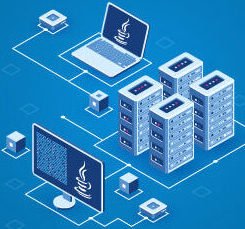Advanced Socket Programming Techniques
in Java Networking

Introduction:
Socket programming is a fundamental aspect of network communication in modern software development. Java, a popular and versatile programming language, provides a robust set of tools and libraries for building networked applications. While basic socket programming is relatively straightforward, advanced techniques are required to address more complex requirements and challenges. Let us explore advanced socket programming techniques in Java networking, which can help developers create more sophisticated and efficient networked applications.
Non-blocking I/O:
One of the challenges in network programming is handling multiple connections simultaneously without blocking the main thread.
Java Programming offers non-blocking I/O using the java. nio package. By utilizing channels and selectors, developers can manage multiple connections efficiently.
Selectors enable the monitoring of multiple channels for events like reading or writing, allowing your application to handle multiple clients without blocking.
Here’s a simplified example of how non-blocking I/O can be used:
Selector selector = Selector.open();
ServerSocketChannel serverSocketChannel = ServerSocketChannel.open();
serverSocketChannel.bind(new InetSocketAddress(8080));
serverSocketChannel.configureBlocking(false);
serverSocketChannel.register(selector, SelectionKey.OP_ACCEPT);
while (true) {
selector.select();
Set<SelectionKey> selectedKeys = selector.selectedKeys();
for (SelectionKey key : selectedKeys) {
if (key.isAcceptable()) {
// Handle incoming connections
SocketChannel clientChannel = serverSocketChannel.accept();
clientChannel.configureBlocking(false);
clientChannel.register(selector, SelectionKey.OP_READ);
} else if (key.isReadable()) {
// Handle incoming data
SocketChannel clientChannel = (SocketChannel) key.channel();
// Read data from the client
}
selectedKeys.remove(key);
}
}
Asynchronous Sockets:
Java introduced asynchronous socket channels (since Java 7) that allow for asynchronous I/O operations without blocking the main thread. This is particularly useful for applications requiring low-latency or handling a large number of concurrent connections. The AsynchronousSocketChannel and AsynchronousServerSocketChannel classes provide the means to perform asynchronous I/O.
Here’s a simplified example:
AsynchronousServerSocketChannel serverSocketChannel = AsynchronousServerSocketChannel.open();
serverSocketChannel.bind(new InetSocketAddress(8080));
serverSocketChannel.accept(null, new CompletionHandler<AsynchronousSocketChannel, Void>() {
@Override
public void completed(AsynchronousSocketChannel clientChannel, Void attachment) {
// Handle incoming connection asynchronously
// Read and write operations can also be done asynchronously
ByteBuffer buffer = ByteBuffer.allocate(1024);
clientChannel.read(buffer, buffer, new CompletionHandler<Integer, ByteBuffer>() {
@Override
public void completed(Integer bytesRead, ByteBuffer buffer) {
// Handle data read
}
@Override
public void failed(Throwable exc, ByteBuffer buffer) {
// Handle error
}
});
serverSocketChannel.accept(null, this);
}
@Override
public void failed(Throwable exc, Void attachment) {
// Handle error
}
});
Multiplexing with Java NIO:
Java NIO (New I/O) introduces multiplexing capabilities that enable developers to handle multiple channels with a single thread efficiently.
The Selector class is a crucial component in achieving this. By registering multiple channels with a selector and using non-blocking I/O, you can manage multiple network connections with ease.
Multiplexing is especially beneficial when building high-performance servers that need to handle numerous clients simultaneously without consuming excessive system resources.
Learn more about this techniques in the best java training institute in bangalore
Secure Socket Layer (SSL) Integration:
Security is a paramount concern when developing networked applications. Java provides robust support for SSL/TLS (Secure Sockets Layer/Transport Layer Security) through the javax.net.ssl package. This enables developers to create secure connections for data transmission over the network, ensuring confidentiality and integrity.To establish an SSL connection, you can use the SSLSocket and SSLServerSocket classes, which extend the standard Socket and ServerSocket classes. Here’s a simplified example:
SSLServerSocketFactory sslServerSocketFactory = (SSLServerSocketFactory) SSLServerSocketFactory.getDefault();
SSLServerSocket sslServerSocket = (SSLServerSocket) sslServerSocketFactory.createServerSocket(8080);
while (true) {
SSLSocket sslClientSocket = (SSLSocket) sslServerSocket.accept();
// Handle secure communication with the client
}
Conclusion:
Advanced socket programming techniques in Java networking are essential for building high-performance, scalable, and secure networked applications.
These techniques, including non-blocking I/O, asynchronous sockets, multiplexing with Java NIO, and SSL integration, provide the tools and flexibility necessary to tackle complex network communication requirements. By mastering these techniques, developers can create robust and efficient networked applications that meet the demands of modern software development.
Whether you are building a high-performance server, a real-time communication system, or a secure data transfer application, these advanced socket programming techniques in Java will prove invaluable in your development efforts.
Why join Java Full Stack Developer course in Alpha Tech Academy?
Alpha Tech Academy offers a dynamic Full Stack Java Developer Training course designed to empower aspiring developers with comprehensive skills.
Join our program to gain a thorough understanding of Java-based full stack development. Benefit from hands-on projects, expert instructors, and an up-to-date curriculum that covers the latest industry trends.
Our commitment extends beyond the classroom, providing valuable career support and job placement assistance. Connect with a diverse network of professionals, and upon completion, receive industry-recognized certification.
Be prepared to excel in the competitive job market, as Full Stack Java Developers are highly sought-after, ensuring a promising career path with endless growth opportunities. Choose Alpha Tech Academy for your journey into the world of Full Stack Java Development.
